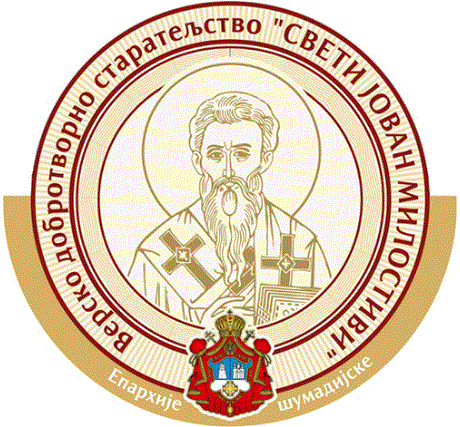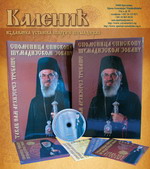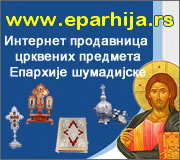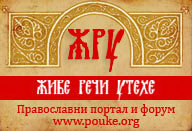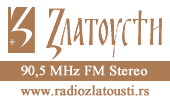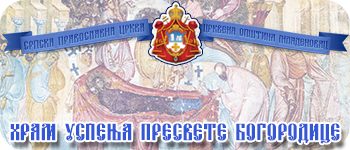Administrator
ВЕЛИКО ПОВЕЧЕРЈЕ У МАНАСТИРУ ЛИПАР
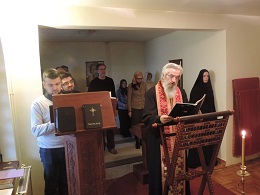 У среду, прве недеље часног поста, Преосвећени Владика Јован служио је велико повечерје у оквиру кога је читао Велики канон Светог Андреја Критског.
У среду, прве недеље часног поста, Преосвећени Владика Јован служио је велико повечерје у оквиру кога је читао Велики канон Светог Андреја Критског.
“ПОСНА ТРПЕЗА” У ШКОЛИ СВЕТОЛИК РАНКОВИЋ У АРАНЂЕЛОВЦУ
 23. (10.) фебруара 2015. године, првог дана Великог поста у Основноj школи “Светолик Ранковић” у Аранђеловцу oдржана је свечаност “Посна трпеза”.
23. (10.) фебруара 2015. године, првог дана Великог поста у Основноj школи “Светолик Ранковић” у Аранђеловцу oдржана је свечаност “Посна трпеза”.
“Посна трпеза” је едукативна школска радионица у којој су предшколци и ученици са својим родитељима, васпитачицама и учитељицама припремали посну храну да би научили шта је пост и која је храна посна. Присутнима се обратио и захвалио директор школе Горан Мићић, а пре почетка припреме хране сви су присуствовали заједничкој молитви са јерејем Милошем Мијатовићем и вероучитељима Златком Вујановићем и ђаконом Немањом Искићем. Након заједничке молитве кратко предавање о значају и суштини поста је одржао вероучитељ Златко Вујановић.
СРЕТЕЊЕ- СРЕТАЊЕ ЧОВЕКА И БОГА
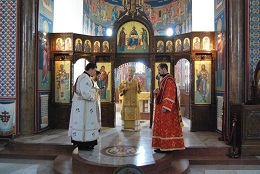 У Сиропусни понедељак Његово Преосвештенство Епископ шумадијски Господин Јован служио је Свету архијерејску Литургију у храму светог Саве на Аеродрому.
У Сиропусни понедељак Његово Преосвештенство Епископ шумадијски Господин Јован служио је Свету архијерејску Литургију у храму светог Саве на Аеродрому.
Преосвећеном владици су саслуживали протојереј-ставрофор Милан Борота, јереј Немања Антонијевић, ђакони Небојша Поповић и Милош Ђурић.
СЕМИНАР У ЛАЗАРЕВЦУ
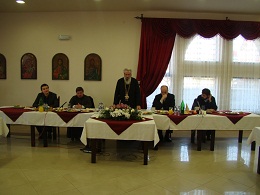 У уторак, 17. фебруара 2015. године, када наша Света Црква прославља св. Исидора Пелусиота, Његово Преосвештенство Епископ шумадијски Господин Јован, служио је Свету Архијерејску Литургију у храму св. влкмч. Димитрија у Лазаревцу. Епископу су саслуживали протојереј-ставрофор др. Зоран Крстић, професор на Богословском факултету у Београду и ректор Богословије у Крагујевцу, протојереј-ставрофор, Видо Милић, Архијерејски намесник бељанички, протојереј-ставрофор Златко Димитријевић, Архијерејски намесник колубарско-посавски, протојереј-ставрофор Марко Митић, старешина храма св. влкмч. Димитрија у Лазаревцу, протођакон Иван Гашић и ђакони: Дарко Павловић, Филип Јовановић и Никола Урошевић.
У уторак, 17. фебруара 2015. године, када наша Света Црква прославља св. Исидора Пелусиота, Његово Преосвештенство Епископ шумадијски Господин Јован, служио је Свету Архијерејску Литургију у храму св. влкмч. Димитрија у Лазаревцу. Епископу су саслуживали протојереј-ставрофор др. Зоран Крстић, професор на Богословском факултету у Београду и ректор Богословије у Крагујевцу, протојереј-ставрофор, Видо Милић, Архијерејски намесник бељанички, протојереј-ставрофор Златко Димитријевић, Архијерејски намесник колубарско-посавски, протојереј-ставрофор Марко Митић, старешина храма св. влкмч. Димитрија у Лазаревцу, протођакон Иван Гашић и ђакони: Дарко Павловић, Филип Јовановић и Никола Урошевић.
протојереј-ставрофор др Зоран Крстић - Perception Solidarity and its Possibility of Theological Implementation in the Serbian Theology
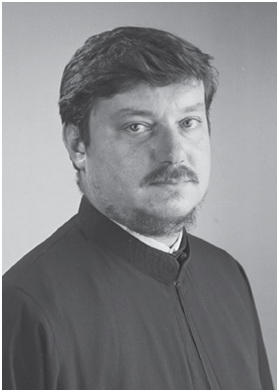 Abstract: In the basics of social teaching in the Roman-catholic Church, solidarity is one of the four elementary principles of learning. Besides its secular origin, perception solidarity gets a theological meaning in the form of social virtue through many social documents of the Roman-catholic Church. Such understanding becomes a novum in theology and is preserved as a sign of the time of its own kind, and therefore replaces or suppresses traditional and evangelical perceptions by which the active love towards the neighbor has been expressed. Is this also acceptable for the Orthodox theology? The author of this article replies positively to this question with a regard that solidarity should be the value of a new Christian ethos that would correspond with democratically organized society and its qualities.
Abstract: In the basics of social teaching in the Roman-catholic Church, solidarity is one of the four elementary principles of learning. Besides its secular origin, perception solidarity gets a theological meaning in the form of social virtue through many social documents of the Roman-catholic Church. Such understanding becomes a novum in theology and is preserved as a sign of the time of its own kind, and therefore replaces or suppresses traditional and evangelical perceptions by which the active love towards the neighbor has been expressed. Is this also acceptable for the Orthodox theology? The author of this article replies positively to this question with a regard that solidarity should be the value of a new Christian ethos that would correspond with democratically organized society and its qualities.
протојереј-ставрофор др Зоран Крстић - Traditional Believers as Pastoral Problem and Challenge
 Abstract: Upon contemporary social researches the author considers the very concept of traditional believer along with a possibility of classification within this vast group of the Church members. In what follows, the relation between traditional believers and the believers in more narrow sense is being analysed from pastoral prospect. Is it complementary and hence can we talk about faith and culture, or they are only magnitudes that exclude each other and thus make tensions and serious problem in pastoral work and Church life, making in that way the results of empirical research of religionness relative? The problem is detected when the believers turn themselves towards the past, while the believers in more narrow sense do so towards the future, it is to say towards the Kingdom of God, employing the pastoral work to reorient the first group.
Abstract: Upon contemporary social researches the author considers the very concept of traditional believer along with a possibility of classification within this vast group of the Church members. In what follows, the relation between traditional believers and the believers in more narrow sense is being analysed from pastoral prospect. Is it complementary and hence can we talk about faith and culture, or they are only magnitudes that exclude each other and thus make tensions and serious problem in pastoral work and Church life, making in that way the results of empirical research of religionness relative? The problem is detected when the believers turn themselves towards the past, while the believers in more narrow sense do so towards the future, it is to say towards the Kingdom of God, employing the pastoral work to reorient the first group.
протојереј-ставрофор др Зоран Крстић - IL NUOVO INCONTRO DELLA CHIESA ORTODOSSA SERBA CON LA MODERNITÀ
 Nell’anno 1931 (mille novecento trentuno), nel Regno della Jugoslavia di quel periodo, è stato emanato lo Statuto della chiesa. Con le relative modifiche tale Statuto è ancora oggi in vigore. E’ stato emanato con il desiderio che fossero risolti i problemi organizzativi causati dall’unione delle parti della Chiesa Ortodossa Serba dopo la Prima Guerra mondiale e che venissero stabilite le relazioni con il nuovo stato, dapprima, lo Stato dei Serbi, Croati e Sloveni, e poi, il Regno della Jugoslavia. Il suddetto documento è interessante per noi e rappresenta l’oggetto dei nostri studi per due motivi: il primo motivo è la sua sola emanazione, perchè tale documento non è in possesso del vecchio patriarcato dell` Est, ma la sua esistenza fa la caratteristica delle nuove chiese ortodosse autocefali del XIX (diciannovesimo) e XX (ventesimo) secolo e ognuno di essi rappresenta un particolare tentativo di codificare la tradizione Canonica della Chiesa ortodossa.
Nell’anno 1931 (mille novecento trentuno), nel Regno della Jugoslavia di quel periodo, è stato emanato lo Statuto della chiesa. Con le relative modifiche tale Statuto è ancora oggi in vigore. E’ stato emanato con il desiderio che fossero risolti i problemi organizzativi causati dall’unione delle parti della Chiesa Ortodossa Serba dopo la Prima Guerra mondiale e che venissero stabilite le relazioni con il nuovo stato, dapprima, lo Stato dei Serbi, Croati e Sloveni, e poi, il Regno della Jugoslavia. Il suddetto documento è interessante per noi e rappresenta l’oggetto dei nostri studi per due motivi: il primo motivo è la sua sola emanazione, perchè tale documento non è in possesso del vecchio patriarcato dell` Est, ma la sua esistenza fa la caratteristica delle nuove chiese ortodosse autocefali del XIX (diciannovesimo) e XX (ventesimo) secolo e ognuno di essi rappresenta un particolare tentativo di codificare la tradizione Canonica della Chiesa ortodossa.
протојереј-ставрофор др Зоран Крстић - How to preserve and promote the values and the identity of Europe facing globalization?
 EPP Group Delegation (European Parliament) to H.H.
EPP Group Delegation (European Parliament) to H.H.
The Ecumenical Patriarch Bartholomew I of Constantinople
Constantinople 09.12.2010.
Dear Brothers and Sisters[1],
It gives me great pleasure and undeserved honour to be here with you today, at the place of such historical and spiritual significance, with regards to the issue that most profoundly permeates our lives and our future. The European values and the process of globalization are those inexhaustible subjects which people of different aspirations and views from various parts of Europe could, as is normal and expected, deal with the way they want. What follows and what I would like to bring your attention and love to is a most common opinion on globalization given by a man living in Eastern Europe, coming from a country in transition, from Serbia, and then a reflection on these from me as an orthodox priest.
протојереј-ставрофор др Зоран Крстић - Утицај економске кризе на социјалну структуру европског друштва
 Impact of the Economical Crisis on the Social Structure of the European Society[1]
Impact of the Economical Crisis on the Social Structure of the European Society[1]
Your Eminence, Venerable Brothers priests, my dear brothers and sisters in Christ, ladies and gentlemen,
It is my pleasure, honor and responsibility to be with you today and on behalf of the Orthodox Church in Serbia participate in the seminar; I hope my humble contribution will help make our joint work fruitful.
It is difficult to touch everything one might say in only ten minutes, all the thoughts and all the feelings, on this ongoing discussion and the problem that have broken into the lives of us all. The presentation I am going to give is split into a few short units, which represent an attempt to analyze and present the social situation in Europe and Serbia and is followed by various possibilities of interpretation and, finally, what could be the specific contribution of the Church's eventual exit from the current crisis.
Political Aspects of Religion, Religious Freedom and Religious Tolerance at the Time of the Emperor Constantine and Today
Протојереј-ставрофор др Зоран Крстић, ванредни професор
Универзитет у Београду – Православни богословски факултет
The author in this paper considers, compares and analyzes the religious tolerance of the Equal to the Apostles Emperor Constantine, expressed in the Edict of Milan along with the current understanding of religious tolerance. A sketch of reasons for emergence of modern religious tolerance is exposed, and its relationship and dependence on political aspects of religion, both in ancient and medieval societies, as well as today. The author also discusses specific contemporary relationship to the truth which gives rise to the transformation of religious tolerance into religious freedom of an individual that is characteristic for modern society but not that of Constantine. In conclusion, the author believes that the beginning of the road that leading to today's social achievements in the field of religious freedom, is the Edict of Milan of the year 313.


